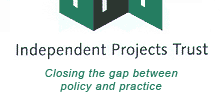
Independent Projects Trust
Children Against
Bullying
BACKGROUND
Bullying is not just a minor child's problem - it can and often does extend into adulthood and is often the 'seed' of violent and aggressive character development. Research suggests that young people who are bullied may tend to become bullies themselves. Research also suggests that young people who are aggressive towards their peers will tend to retain their aggression and manifest it later in live as adults. In addition, young people who engage in bullying run an increased risk of later engaging in other problem behaviour such as crime and alcohol/drug abuse.
These issues highlight the need to develop active measures against bullying. In addition, they suggest that intervention programmes should be aimed at young children in an attempt to discourage the bully and empower the victim/survivor.
THE PROGRAMME
The programme is designed to dispel major myths about bullying and its primary aims include:
- Reducing bullying wherever it may occur.
- Preventing bullying behaviour.
- Replacing bullying behaviour with more acceptable behaviour.
- Improving peer relationships within the social context.
The programme is arranged over three phases within which specific steps exist.
Phase One involves working with teachers and learners to establish the extent to which they recognise and experience bullying behaviour in their contexts. This phase culminates in a workshop that creates general awareness of bullying within the school context and presenting to the teachers and learners the outcome of the data gathering. Specific grades of learners are then identified as potential targets for future intervention, based on the outcome of the data gathering process and the workshops.
Phase two aims specifically at the class/grade/group level. Teachers are trained at implementing the programme and then supported in the implementation.
Simultaneously, Phase Three works on developing strategies for specific learners who are repeatedly targets of bullying both in the school context and in the broader social context.


